最新4A朗文Chapter-4和5知识点梳理资料
香港朗文4a各单元总结
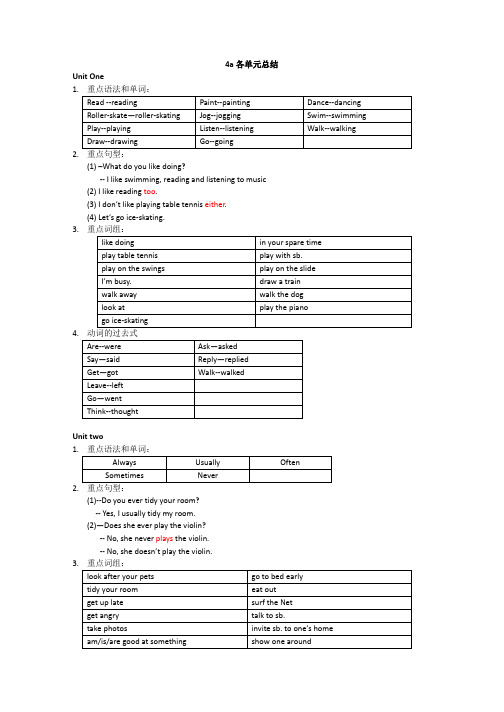
4a各单元总结Unit One1.2.重点句型:(1) –What do you like doing?-- I like swimming, reading and listening to music(2) I like reading too.(3) I don’t like playing table tennis either.(4) Let’s go ice-skating.3.4.Unit two1.2.重点句型:(1)--Do you ever tidy your room?-- Yes, I usually tidy my room.(2)—Does she ever play the violin?-- No, she never plays the violin.-- No, she doesn’t play the violin.3.4.Unit Three1.2.3.重点句型:(1)--Was there any cola when you were young?-Yes, there was.(2)The game I like best was marbles.(3)How do you play marbles?(4)– Did you wear trainers fifty years ago?--Yes, I did.(5)—Did you have a telephone?-- No, I didn’t. Rich people had telephones at home but poor people didn’t.(6 ) – Did you shop at the supermarket?--- No, I didn’t. There weren’t any supermarkets.(7) – Did you go to school?-- No, I didn’t. Rich children go to school but poor children didn’t.(8) –Did you listen to the radio?-- Yes, I did.Where(哪里)do you like going to in your holiday?How(如何)do you help at home?How much (多少钱,提问不行数名词)is it? --- It is five dollars. How many (多少,提问可数名词)books in your home?What time(什么时间)is it?What(什么)are you doing now? ----I am doing my homework. What(什么)is the weather like today? ----It’s windy.What color (什么颜色)is it? ---- It is red.What (什么)are you? ( What do you do?) -----I am a driver.When(什么时候)is your birthday? ---on 2nd MayHow old(多大)are you? ----I am ten.Who (谁) are you? -----I am David.Which(哪一个) club do you want to join?Why(为什么)do you like playing football?----Because I like being healthy.。
香港朗文版4A-Chapter4-Five-hundred-years-ago

22 rice and meat
Were there any tunnels 500 years ago?
a tunnel
a rope bridge
23
Were there any long bridges
500 years ago?
long bridge
short bridge
24
大部分人: most people 一些人: Some people 少部分人: a few people 几乎没人: few people 没人: no people no one
ed-id
need-needed
ed-id
ed的三种发音: 清读清(t), 浊读浊(d) t,d 结尾读 id
30
No, there weren’t.
How was life 500 years ago? Were there any supermarkets?
31
No, they didn’t.
Five hundred years ago
1
About 500 years ago the year 1513 Ming dynasty
Zhu yuan zhang
The emperor of Ming dynasty
2
People
• 士 scholar • 农 farmer • 工 worker • 商 businessman
25
Part E
26
27
People didn't .... There was/ were... There wasn't/ weren't...
28
词尾-ed 的发音 ask-asked bake-baked cook-cooked drop-dropped finish-finished help-helped like-liked look-looked surf-surfed
四年级朗文新思维英语第四章chapter4-教师版
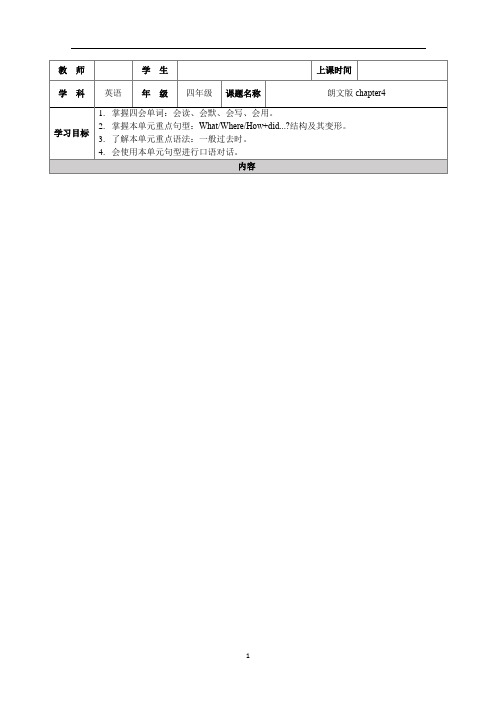
二、根据单词的正确形式填空。
1.What________(do) children do in their spare time 60 years ago?
--Most children________(play) hide-and-seek.
[作业]
请将所说短语,默写在下面横线处。
1.A:_______________________________________________
B:_______________________________________________
2.A:______________________________________________
——Most peopleworecotton clothes. Some peopleworesilk clothes.
[解析]
[翻译]——他们过去吃什么呢?
——大多数人吃粥和蔬菜,一些人吃米饭和肉。
2.“How did +主语+动词原型+其他?”表示:过去做什么怎么样?”
课文原句:——Howdidpeople travel?
B:_______________________________________________
3.A:______________________________________________
——Most peoplewalkedorrodehorses. Rich peopletravelledby sedan chair.Some people rode horses.
[解析]
[翻译]——过去人们如何做饭呢?
香港朗文英语4A-Chapter-5复习提要
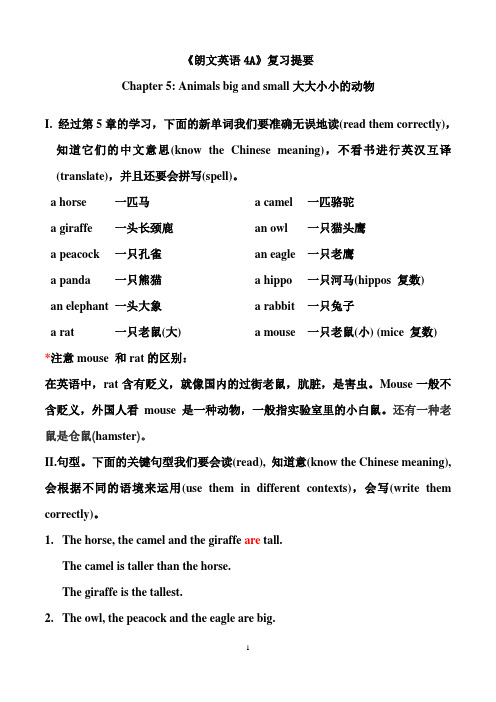
《朗文英语4A》复习提要Chapter 5: Animals big and small大大小小的动物I. 经过第5章的学习,下面的新单词我们要准确无误地读(read them correctly),知道它们的中文意思(know the Chinese meaning),不看书进行英汉互译(translate),并且还要会拼写(spell)。
a horse 一匹马 a camel 一匹骆驼a giraffe 一头长颈鹿an owl 一只猫头鹰a peacock 一只孔雀an eagle 一只老鹰a panda 一只熊猫 a hippo 一只河马(hippos 复数)an elephant 一头大象 a rabbit 一只兔子a rat 一只老鼠(大) a mouse 一只老鼠(小) (mice 复数)*注意mouse 和rat的区别:在英语中,rat含有贬义,就像国内的过街老鼠,肮脏,是害虫。
Mouse一般不含贬义,外国人看mouse是一种动物,一般指实验室里的小白鼠。
还有一种老鼠是仓鼠(hamster)。
II.句型。
下面的关键句型我们要会读(read), 知道意(know the Chinese meaning), 会根据不同的语境来运用(use them in different contexts),会写(write them correctly)。
1. The horse, the camel and the giraffe are tall.The camel is taller than the horse.The giraffe is the tallest.2. The owl, the peacock and the eagle are big.The peacock is bigger than the owl.The eagle is the biggest.3. The panda, the hippo and the elephant are heavy.The hippo is heavier than the panda.The elephant is the heaviest.4. The rabbit, the rat and the mouse are small.The rat is smaller than the rabbit.The mouse is the smallest.总结: (1). 比较级结构:A+ be+ adj.er + than+ B. : A比B……be动词由时态和主语A决定。
最新香港朗文4A各单元知识要点 词汇语法
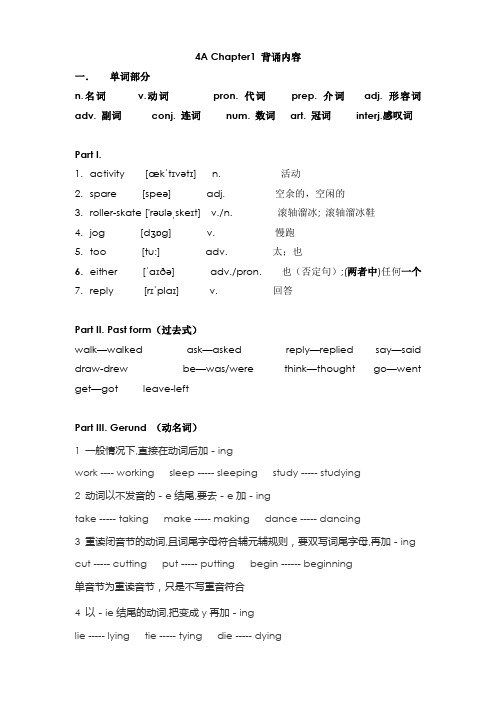
4A Chapter1 背诵内容一.单词部分n.名词v.动词pron. 代词prep. 介词adj. 形容词adv. 副词conj. 连词num. 数词art. 冠词interj.感叹词Part I.1.activity [ækˈtɪvətɪ] n. 活动2.spare [speə] adj. 空余的,空闲的3.roller-skate ['rəʊləˌskeɪt] v./n. 滚轴溜冰; 滚轴溜冰鞋4.jog [dʒɒg] v. 慢跑5.too [tu:] adv. 太;也6.either [ˈaɪðə] adv./pron. 也(否定句);(两者中)任何一个7.reply [rɪˈplaɪ] v. 回答Part II. Past form(过去式)walk—walked ask—asked reply—replied say—said draw-drew be—was/were think—thought go—went get—got leave-leftPart III. Gerund (动名词)1 一般情况下,直接在动词后加-ingwork ---- working sleep ----- sleeping study ----- studying2 动词以不发音的-e结尾,要去-e加-ingtake ----- taking make ----- making dance ----- dancing3 重读闭音节的动词,且词尾字母符合辅元辅规则,要双写词尾字母,再加-ing cut ----- cutting put ----- putting begin ------ beginning单音节为重读音节,只是不写重音符合4 以-ie结尾的动词,把变成y再加-inglie ----- lying tie ----- tying die ----- dying二.词组部分1.i n one’s spare time在某人的空余时间2.listen to (the) music 听音乐3.play chess 下棋4.like/love/enjoy doing 喜欢干某事5.go swimming (去)游泳6.go jogging (去)慢跑7.go roller-skating (去)溜冰8.be good at sth./doing 擅长于某事/干某事9.be poor at sth./doing 不擅长于某事/干某事10.be interested in sth./doing 对干某事/干某事感兴趣11.be afraid of sth./doing 害怕某事/干某事12.at/on the weekend 在周末at/on weekends13.on weekdays 在工作日14.be busy with sth. 忙于某事15.be busy doing 忙于干某事16.enjoy oneself= have a good time 某人玩得很开心17.a family helper 一位家庭帮手18.pick up kids 接小孩19.play the piano/violin 弹钢琴,拉小提琴(西洋乐器名词前加the )20.play Erhu 拉二胡(民族乐器前无the)21.play table tennis 打羽毛球(球类名词前无the)22.play on the swing/slide 在秋千(滑滑梯)上玩23.play with sb. 与某人一起玩24.play with sth. 玩耍某物25.a bit later 一会儿以后26.walk away sadly 难过地走开了27.walk the dog 溜狗28.walk home=go home on foot 走回家29.go home =go back home 回家30.after that 在那以后31.the black notes (钢琴上)黑键32.see sb. doing 看到某人在干某事33.make a new friend named Tom 交了一个叫汤姆的朋友34.in fact = actually/ˈæktʃʊəlɪ/事实上35.in the gym 在体育馆36.indoor stadium /'steɪdɪəm/ 室内体育馆37.finish sth./doing sth. 完成某事/干某事38.be important to sb. 对某人而言是重要的(绿色字体部分为拓展内容,供学有余力的小朋友默写。
香港朗文英语4A Chapter 5复习提要
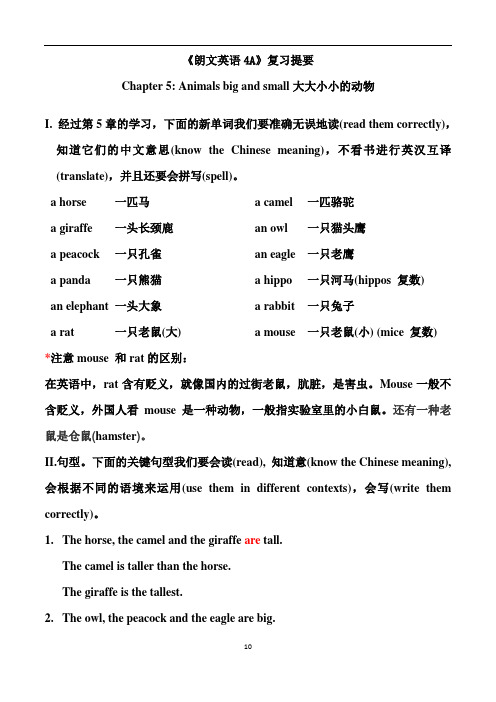
《朗文英语4A》复习提要Chapter 5: Animals big and small大大小小的动物I. 经过第5章的学习,下面的新单词我们要准确无误地读(read them correctly),知道它们的中文意思(know the Chinese meaning),不看书进行英汉互译(translate),并且还要会拼写(spell)。
a horse 一匹马 a camel 一匹骆驼a giraffe 一头长颈鹿an owl 一只猫头鹰a peacock 一只孔雀an eagle 一只老鹰a panda 一只熊猫 a hippo 一只河马(hippos 复数)an elephant 一头大象 a rabbit 一只兔子a rat 一只老鼠(大) a mouse 一只老鼠(小) (mice 复数)*注意mouse 和rat的区别:在英语中,rat含有贬义,就像国内的过街老鼠,肮脏,是害虫。
Mouse一般不含贬义,外国人看mouse是一种动物,一般指实验室里的小白鼠。
还有一种老鼠是仓鼠(hamster)。
II.句型。
下面的关键句型我们要会读(read), 知道意(know the Chinese meaning), 会根据不同的语境来运用(use them in different contexts),会写(write them correctly)。
1. The horse, the camel and the giraffe are tall.The camel is taller than the horse.The giraffe is the tallest.2. The owl, the peacock and the eagle are big.The peacock is bigger than the owl.The eagle is the biggest.3. The panda, the hippo and the elephant are heavy.The hippo is heavier than the panda.The elephant is the heaviest.4. The rabbit, the rat and the mouse are small.The rat is smaller than the rabbit.The mouse is the smallest.总结: (1). 比较级结构:A+ be+ adj.er + than+ B. : A比B……be动词由时态和主语A决定。
香港朗文版4A-Chapter4-Five-hundred-years-agoPPT课件
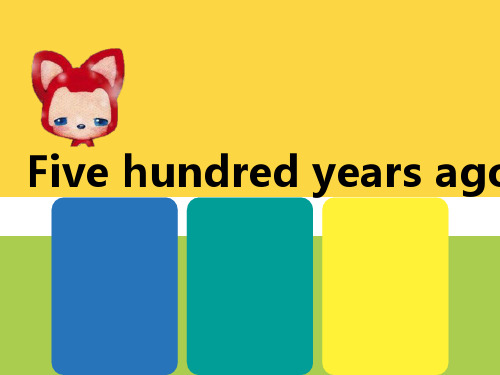
-
3
What did people wear five hundred years ago?
Silk clothes
Cotton clothes
-
4
Ship
How did people travel?
Vehicles(工具)
boat
-
5
horse
Carriage
-
6
sedan chair
-
7
cook with
gas?
32
-
They cooked with
firewood.
How did
they cook?
33
-
Most people ate congee and vegetables.
Some people ate rice and meat.
What did
they eat?
34
congee and vegetables
22 rice and meat -
Were there any tunnels 500 years ago?
a tunnel
a rope bridge
23
-
Were there any long bridges
500 years ago?
long bridge
28
-
词尾-ed 的发音 ask-asked
call-called
bake-baked
clean-cleaned
cook-cooked
jog-jogged
drop-dropped
listen-listened
finish-finished
香港朗文4a各单元总结汇编
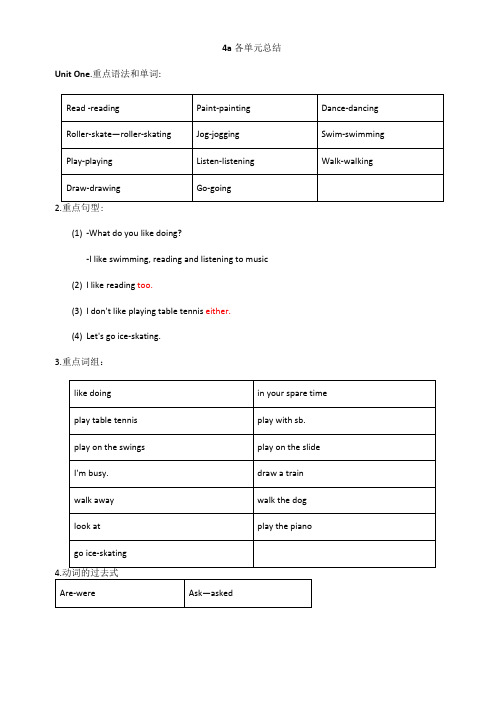
4a各单元总结Unit One.重点语法和单词:2.重点句型:(1)-What do you like doing?-I like swimming, reading and listening to music(2)I like reading too.(3)I don't like playing table tennis either.(4)Let's go ice-skating.3.重点词组:Unit two 1.重点语法和单词:2.重点句型:(l)-Do you ever tidy your room?--Yes, I usually tidy my room.(2)—Does she ever play the violin?-No, she never plays the violin.-No, she doesn't play the violin.2.重点单词和词组:3.重点句型:(1) -Was there any cola when you were young?- Yes, there was.(2)The game I like best was marbles.(3)How do you play marbles?(4)- Did you wear trainers fifty years ago?-Yes, I did.(5)—Did you have a telephone?--No, I didn't. Rich people had telephones at home but poor people didn/t. (6 )一Did you shop at the supermarket?■一No, I didn't. There weren't any supermarkets.(7)- Did you go to school?一No, I didn't. Rich children go to school but poor children didn't.(8)-Did you listen to the radio?-Yes, I did.Where (哪里)do you like going to in your holiday ?How (如何)do you help at home?How much (多少钱,提问不可数名词)is it? It is five dollars. How many (多少,提问可数名词)books in your home? What time (什么时间)is it?What (什么)are you doing now? —I am doing my homework.What (什么)is the weather like today?——It's windy.What color (什么颜色)is it? — It is red.What (什么)are you? ( What do you do?)1 am a driver.When (什么时候)is your birthday? ---on 2nd MayHow old (多大)are you?——I am ten.Who (谁)are you?1 am David.Which(哪一个)club do you want to join?Why(为什么)do you like playing football?——Because I like being healthy.。
4A朗文Chapter 4和5知识点梳理

4A朗文Chapter 4与5知识点梳理【必讲知识点】1、辨析 few,a few, little, a little:few 极少,几乎没有表示“否定”意义接可数名词复数形式a few 少许表示“肯定”意义接可数名词复数形式little 极少,几乎没有表示“否定”意义接不可数名词a little 少许表示“肯定”意义接不可数名称2、 fewer与 less都可以表示“更少”(1) fewer 后接可数名词得复数形式,就是 few得比较级(2) less 后接不可数名词,就是 little得比较级3、辨析 much,many, so much与 so manyso much 如此多接不可数名词so many 如此多接可数名词得复数形式much 许多接不可数名词many 许多接可数名词得复数形式4、 a lot of = lots of 表示许多,后可接可数名词得复数形式以及不可数名词。
5、 stop 用法stop to do 停止去做另外一件事stop doing 停止做某事(指手头得事)6、There be句型得一般过去时1.肯定式there be句型得一般过去时表示过去某地或某时存在某人或某物,其一般过去时态得陈述句由“there+was/were+主语+地点状语+时间状语”构成。
there was后接单数名词;there were后接复数名词。
例如:There was a car under the tree a moment ago、刚才这棵树下有一辆小轿车。
There were two foreign teachers in our school last year、去年我们学校有两名外教。
2.否定式there be句型一般过去时得否定式就是在动词was或were得后面加not,可缩写为wasn’t或weren’t。
例如:There wasn’t a film in the cinema last night、昨晚电影院里没有演电影。
朗文英语Longman 4A-4
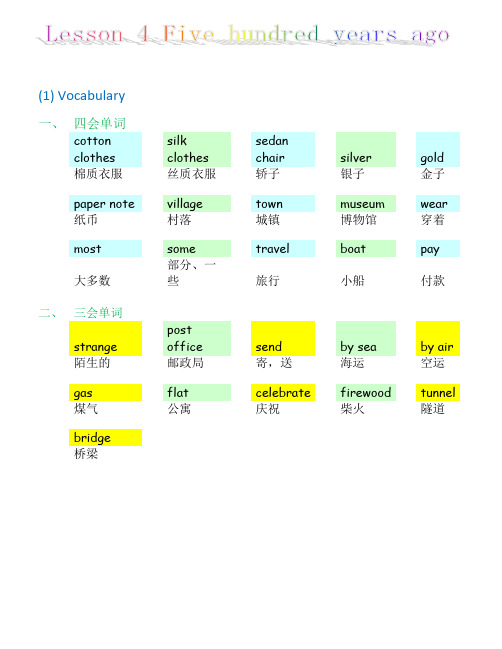
(1) Vocabulary一、四会单词cotton clothes silkclothessedanchair silver gold棉质衣服丝质衣服轿子银子金子paper note village town museum wear 纸币村落城镇博物馆穿着most some travel boat pay大多数部分、一些旅行小船付款二、三会单词strange postoffice send by sea by air陌生的邮政局寄,送海运空运gas flat celebrate firewood tunnel 煤气公寓庆祝柴火隧道bridge桥梁(2)Grammar①本课主要句型:过去式特殊疑问句疑问词+did+主语+动词原形+…?疑问词:(when、where、who、 what、 why、 how)答句的动词注意使用过去时。
Key structures1. What did people wear(动词原形) five hundred years ago? 五百年前人们穿什么?Most people wore(过去时) cotton clothes.大多数人穿棉质衣服。
Some people wore(过去时)silk clothes. 有一些人穿丝质衣服。
2. How did people travel(动词原形)? 过去人们怎样出行?Most people walked(过去时) or rode(过去时) horses. 大多数人走路或者骑马。
Rich people travelled(过去时)by sedan chair. 富人坐轿子出行。
Some people travelled(过去时)by boat. 有些人坐小船出行。
3. How did people pay for things? 过去人们怎样付款买东西?Most people paid with silver or gold. 大多数人付银子或者金子。
(完整)香港朗文4a各单元总结笔记,推荐文档

(完整)香港朗文4a各单元总结笔记,推荐文档香港朗文4a各单元总结笔记Unit 1: My Family- Introduces vocabulary related to family members and their descriptions.- Practice forming sentences using possessive pronouns.- Learn to ask and answer questions about family members.Unit 2: My School- Introduces vocabulary related to school subjects and facilities.- Learn to describe school activities and daily routines.- Practice forming sentences using time phrases.Unit 3: My Friends- Introduces vocabulary related to friends and their characteristics.- Learn to describe personalities and physical appearances.Unit 4: My Hobbies- Introduces vocabulary related to hobbies and leisure activities.- Learn to express preferences and interests.- Practice forming sentences using the present continuous tense.Unit 5: My City- Introduces vocabulary related to places in a city.- Practice giving directions and talking about locations.- Learn to use prepositions of place.Unit 6: My Country- Introduces vocabulary related to countries, nationalities, and cultures.- Learn to talk about countries' landscapes and traditions.- Practice using adjectives to describe places.Unit 7: My Holidays- Introduces vocabulary related to holidays and celebrations.- Learn to describe past experiences and talk about future plans.- Practice using past simple and future tenses.Unit 8: My Future- Introduces vocabulary related to dream jobs and future aspirations.- Learn to express hopes and ambitions.- Practice forming sentences using modal verbs.这个文档总结了香港朗文4a课程的各个单元内容,包括所学词汇、语法和句型。
4AChapter4单词句型
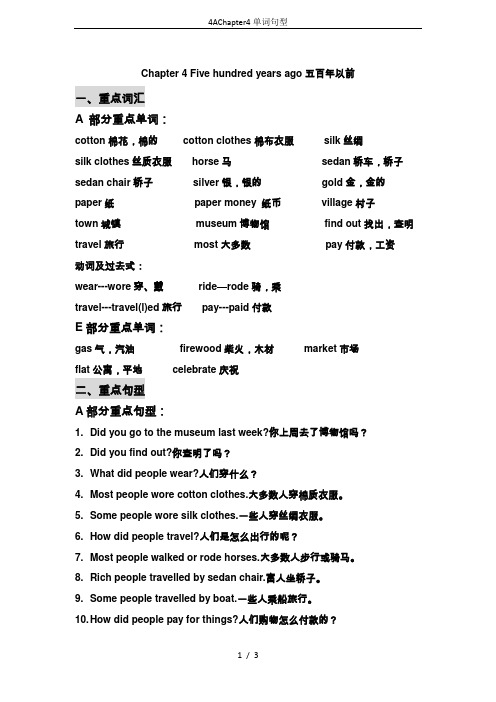
Chapter 4 Five hundred years ago五百年以前一、重点词汇A 部分重点单词:cotton棉花,棉的cotton clothes棉布衣服silk丝绸silk clothes丝质衣服horse马sedan轿车,轿子sedan chair轿子silver银,银的gold金,金的paper纸paper money 纸币village村子town城镇museum博物馆find out找出,查明travel旅行most大多数pay付款,工资动词及过去式:wear---wore穿、戴ride—rode骑,乘travel---travel(l)ed旅行pay---paid付款E部分重点单词:gas气,汽油firewood柴火,木材market市场flat公寓,平地celebrate庆祝二、重点句型A部分重点句型:1. Did you go to the museum last week?你上周去了博物馆吗?2. Did you find out?你查明了吗?3. What did people wear?人们穿什么?4. Most people wore cotton clothes.大多数人穿棉质衣服。
5. Some people wore silk clothes.一些人穿丝绸衣服。
6. How did people travel?人们是怎么出行的呢?7. Most people walked or rode horses.大多数人步行或骑马。
8. Rich people travelled by sedan chair.富人坐轿子。
9. Some people travelled by boat.一些人乘船旅行。
10. How did people pay for things?人们购物怎么付款的?11. Most people paid with silver and gold.大多数人用金银付款。
最新4A朗文Chapter-4和5知识点梳理资料
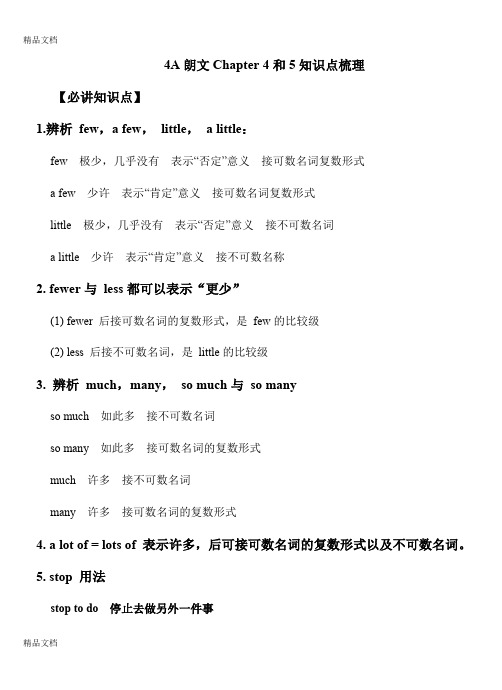
4A朗文Chapter 4和5知识点梳理【必讲知识点】1.辨析few,a few,little,a little:few 极少,几乎没有表示“否定”意义接可数名词复数形式a few 少许表示“肯定”意义接可数名词复数形式little 极少,几乎没有表示“否定”意义接不可数名词a little 少许表示“肯定”意义接不可数名称2. fewer与less都可以表示“更少”(1) fewer 后接可数名词的复数形式,是few的比较级(2) less 后接不可数名词,是little的比较级3. 辨析much,many,so much与so manyso much 如此多接不可数名词so many 如此多接可数名词的复数形式much 许多接不可数名词many 许多接可数名词的复数形式4. a lot of = lots of 表示许多,后可接可数名词的复数形式以及不可数名词。
5. stop 用法stop to do 停止去做另外一件事stop doing 停止做某事(指手头的事)6.There be句型的一般过去时1.肯定式there be句型的一般过去时表示过去某地或某时存在某人或某物,其一般过去时态的陈述句由“there+was/were+主语+地点状语+时间状语”构成。
there was后接单数名词;there were后接复数名词。
例如:There was a car under the tree a moment ago. 刚才这棵树下有一辆小轿车。
There were two foreign teachers in our school last year. 去年我们学校有两名外教。
2.否定式there be句型一般过去时的否定式是在动词was或were的后面加not,可缩写为wasn’t或weren’t。
例如:There wasn’t a film in the cinema last night. 昨晚电影院里没有演电影。
最新4A朗文Chapter-4和5知识点梳理资料
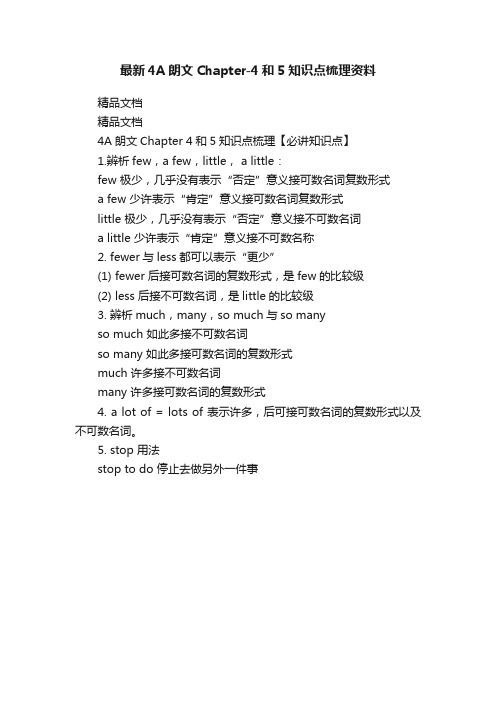
最新4A朗文Chapter-4和5知识点梳理资料
精品文档
精品文档
4A朗文Chapter 4和5知识点梳理【必讲知识点】
1.辨析few,a few,little, a little:
few 极少,几乎没有表示“否定”意义接可数名词复数形式
a few 少许表示“肯定”意义接可数名词复数形式
little 极少,几乎没有表示“否定”意义接不可数名词
a little 少许表示“肯定”意义接不可数名称
2. fewer与less都可以表示“更少”
(1) fewer 后接可数名词的复数形式,是few的比较级
(2) less 后接不可数名词,是little的比较级
3. 辨析much,many,so much与so many
so much 如此多接不可数名词
so many 如此多接可数名词的复数形式
much 许多接不可数名词
many 许多接可数名词的复数形式
4. a lot of = lots of 表示许多,后可接可数名词的复数形式以及不可数名词。
5. stop 用法
stop to do 停止去做另外一件事。
朗文英语4A 重点单词句型

Sentences:What do you like doing in your spare time? What do you like doing when you’re free?I like roller-skating, painting and reading. She doesn’t like reading or singing.They can play chess.你业余时间喜欢做什么?你业余时间喜欢做什么?我喜欢溜冰、绘画和阅读。
她不喜欢读书或唱歌。
他们可以下棋。
Sentences:Do you ever tidy your room? Yes, I usually tidy my room. Does he ever surfer the Net? No, he never surfs the Net.This is my best friend, Ken.He likes playing sport.He plays a lot of sport every week. 你曾经整理你的房间吗?是的,我通常整理房间。
他曾经上网吗?不,他从不上网。
这是我最好的朋友,肯。
他喜欢运动。
他每周运动一次。
Sentences:Was there any fast food when you were young, Grandma? Yes, there was.No, there wasn’t.Were there any comics when you were young, Grandpa?Yes, there were.No, there weren’t.Did you were trainers fifty years ago?Yes, I did.No, I didn’t. Rich people had telephones at home but poor people didn’t.当你(您)年轻时有什么快餐,奶奶?是的,有。
- 1、下载文档前请自行甄别文档内容的完整性,平台不提供额外的编辑、内容补充、找答案等附加服务。
- 2、"仅部分预览"的文档,不可在线预览部分如存在完整性等问题,可反馈申请退款(可完整预览的文档不适用该条件!)。
- 3、如文档侵犯您的权益,请联系客服反馈,我们会尽快为您处理(人工客服工作时间:9:00-18:30)。
精品文档
精品文档
4A朗文Chapter 4和5知识点梳理【必讲知识点】
1.辨析few,a few,little, a little:
few 极少,几乎没有表示“否定”意义接可数名词复数形式
a few 少许表示“肯定”意义接可数名词复数形式
little 极少,几乎没有表示“否定”意义接不可数名词
a little 少许表示“肯定”意义接不可数名称
2. fewer与less都可以表示“更少”
(1) fewer 后接可数名词的复数形式,是few的比较级
(2) less 后接不可数名词,是little的比较级
3. 辨析much,many,so much与so many
so much 如此多接不可数名词
so many 如此多接可数名词的复数形式
much 许多接不可数名词
many 许多接可数名词的复数形式
4. a lot of = lots of 表示许多,后可接可数名词的复数形式以及不可数名词。
5. stop 用法
stop to do 停止去做另外一件事。
